
Robert Colin Stigwood was an Australian-born British-resident music entrepreneur, film producer and impresario, best known for managing Cream, Andy Gibb and the Bee Gees, theatrical productions like Hair and Jesus Christ Superstar, and film productions including Grease and Saturday Night Fever. On his death, one obituary judged that he had been for a time the most powerful tycoon in the entertainment industry: "Stigwood owned the record label that issued his artists’ albums and film soundtracks, and he also controlled publishing rights – not since Hollywood's golden days had so much power and wealth been concentrated in the hands of one mogul."
Mike Berry is a British singer and actor. He is known for his top ten hits "Don't You Think It's Time" (1963) and "The Sunshine of Your Smile" (1980) in a singing career spanning nearly 60 years. He became an actor in the 1970s, and was best known for his appearances as Mr. Spooner in the British sitcom Are You Being Served? in the early 1980s.
Michael Sarne is a British actor, singer, writer, producer and director, who also had a brief career as a pop singer in the 1960s. Sarne directed the films Joanna (1968) and Myra Breckinridge (1970). He has appeared as an actor in several films including A Place to Go (1965), Two Weeks in September (1967), and Moonlighting (1982).
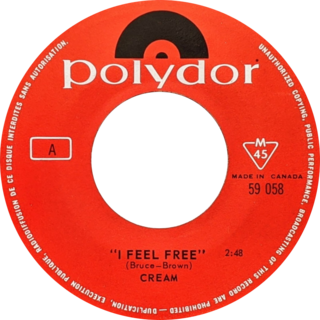
"I Feel Free" is a song first recorded by the British rock band Cream. The lyrics were written by Pete Brown, with the music by Jack Bruce. The song showcases the band's musical diversity, effectively combining blues rock with psychedelic pop.
"Butterfly" is a popular song written by Bernie Lowe and Kal Mann and published in 1957. The song is credited to Anthony September as songwriter in some sources. This was a pseudonym of Anthony Mammarella, producer of American Bandstand.

"I Write the Songs" is a popular song written by Bruce Johnston in 1975 and released on his album Going Public in 1977. Barry Manilow's version reached number one on the Billboard Hot 100 chart in January 1976 after spending two weeks atop the Billboard adult contemporary chart in December 1975. It won a Grammy Award for Song of the Year and was nominated for Record of the Year in 1977. Billboard ranked it as the No. 13 song of 1976.
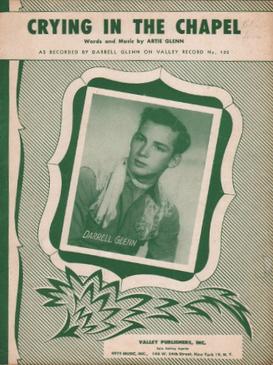
"Crying in the Chapel" is a song written by Artie Glenn and recorded by his son Darrell Glenn. The song was released in 1953 and reached number six on the Billboard chart.

"The Beat Goes On" is a song written and composed by Sonny Bono and recorded by Sonny & Cher. It was issued as a single and appeared on their 1967 album In Case You're in Love. It entered the Billboard Hot 100 chart on January 14, 1967, peaking at number six.

"Walk On By" is a song written by Burt Bacharach and Hal David for singer Dionne Warwick in 1963. Warwick's recording of the song peaked at number 6 on the US Billboard Hot 100 and number 1 on the Cash Box Rhythm and Blues Chart In June 1964 and was nominated for a 1965 Grammy Award for the Best Rhythm and Blues Recording.
"Samba pa ti" is an instrumental by Latin rock band Santana, from their 1970 album, Abraxas. In English, the title means "Samba for You." It was released as a single in 1973. The song charted at No. 11 in the Netherlands, No. 43 on the German charts, and No. 27 on the UK Singles Chart, Santana's first single to chart in the United Kingdom.

"The Next Time" backed with "Bachelor Boy" was the first of three number one hit singles from the Cliff Richard musical, Summer Holiday. Both sides were marketed as songs with chart potential, and the release is viewed retroactively as a double A-side single. However, technically double A-sides were not regarded as such until 1965, so "The Next Time" was pressed as the A-side, with "Bachelor Boy" the B-side. The song was succeeded at number one by The Shadows' "Dance On!".
Carol Hedges, known professionally as Billie Davis, is an English singer who had hits in the 1960s, and is best remembered for the UK hit version of the song, "Tell Him" (1963) and "I Want You to Be My Baby" (1968).
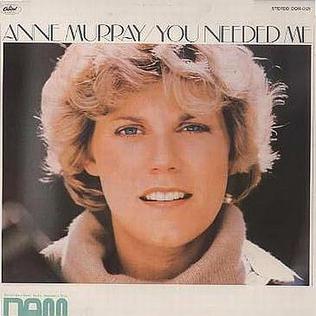
"You Needed Me" is a song written by Randy Goodrum, who describes it as being about "unconditional undeserved love". It was a number-one single in the United States in 1978 for Canadian singer Anne Murray, for which she won a Grammy Award. In 1999, Irish pop band Boyzone recorded a hit cover of the song that reached number one on the UK Singles Chart.

"Grease" is a song written by Barry Gibb and recorded by Frankie Valli : it was released as a single in May 1978. It is the title song for the musical motion picture Grease of that year, which was in turn based on the 1971 stage play Grease. The song celebrates the greaser lifestyle, and it sold over seven million copies worldwide and appeared twice on the film's soundtrack, first as the opening track and again as the closing track. "Grease" is one of four songs written specifically for the film that had not been in the stage production.
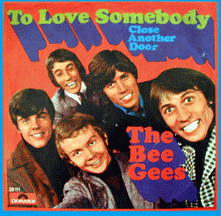
"To Love Somebody" is a song written by Barry and Robin Gibb. Produced by Robert Stigwood, it was the second single released by the Bee Gees from their international debut album, Bee Gees 1st, in 1967. The single reached No. 17 in the United States and No. 41 in the United Kingdom. The song's B-side was "Close Another Door". The single was reissued in 1980 on RSO Records with "How Can You Mend a Broken Heart" as its flipside. The song ranked at number 94 on NME magazine's "100 Best Tracks of the Sixties". The entry was a minor hit in France but reached the top 10 in Canada.
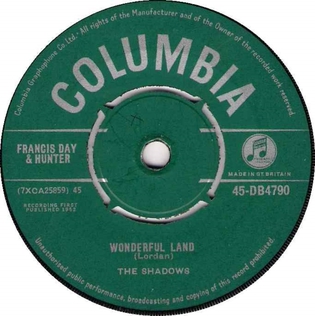
"Wonderful Land" is an instrumental piece written by Jerry Lordan and first recorded and released as a single by The Shadows in February 1962. It stayed at number one for eight weeks on the UK Singles Chart, a feat only Elvis Presley, the Shadows and the Archies managed in the whole of the 1960s.

"Rock Bottom" was the British entry in the Eurovision Song Contest 1977, performed in English by Lynsey de Paul and Mike Moran. It was also written and produced by de Paul and Moran and released on the Polydor record label. Originally it was written for the group Blue Mink; and submitted unbeknown to de Paul and Moran as an entry for A Song For Europe by the publishers; when it was selected, de Paul agreed to perform the song if Moran would join her. On 9 March 1977, "Rock Bottom" was selected to represent the UK at the A Song for Europe 1977 event held at the New London Theatre, presented by Terry Wogan.

"Yesterday" is a song by American R&B singer Toni Braxton. It was written by Braxton, Jerome Armstrong, Terrence Battle, Michael White, and DJ Frank E and produced by the latter for her seventh studio album Pulse (2010). Selected as the album's lead single, it was released by Atlantic Records to US radios on September 29, 2009. American singer Trey Songz appears on the Troy Taylor radio edit of "Yesterday," which served as the American version released to radio. Outside North America, the original version of the song was released, which features only Braxton's vocals.

Charles Blackwell was an English arranger, record producer and songwriter.
This is the discography of English singer Elkie Brooks.














